Related Research Articles

The Darling River is the third-longest river in Australia, measuring 1,472 kilometres (915 mi) from its source in northern New South Wales to its confluence with the Murray River at Wentworth. Including its longest contiguous tributaries it is 2,844 km (1,767 mi) long, making it the longest river system in Australia. The Darling River is the outback's most famous waterway.
Aden Derek Ridgeway is an Australian former politician. He was a member of the Australian Senate for New South Wales from 1999 to 2005, representing the Australian Democrats. During his term he was the only Aboriginal member of the Australian Parliament. He is currently a spokesperson for Recognise, the movement to recognise Aboriginal and Torres Strait peoples in the Australian Constitution.

The Aboriginal and Torres Strait Islander Commission (ATSIC) (1990–2005) was the Australian Government body through which Aboriginal Australians and Torres Strait Islanders were formally involved in the processes of government affecting their lives, established under the Hawke government in 1990. A number of Indigenous programs and organisations fell under the overall umbrella of ATSIC.

Barwon River, a perennial river that is part of the Murray–Darling basin, is located in the north-west slopes and Orana regions of New South Wales, Australia.

Lowitja O'Donoghue, also known as Lois O'Donoghue and Lois Smart, was an Australian public administrator and Indigenous rights advocate. She was the inaugural chairperson of the Aboriginal and Torres Strait Islander Commission (ATSIC) from 1990 to 1996. She is known for her work in improving the health and welfare of Indigenous Australians, and also for the part she played in the drafting of the Native Title Act 1993, which established native title in Australia.
NAIDOC Week is an Australian observance lasting from the first Sunday in July until the following Sunday. The acronym NAIDOC stands for National Aborigines' and Islanders' Day Observance Committee. NAIDOC Week has its roots in the 1938 Day of Mourning, becoming a week-long event in 1975.

Ellen José (1951 – 2 June 2017) was an Australian Indigenous artist, photographer and anarchist. She was a Torres Strait Islander descendant from Murray, Darnley and Horn Islands who lived in Melbourne with husband and fellow anarchist Joseph Toscano.

Henrietta Marrie is a Gimuy Walubara Yidinji elder, an Australian Research Council Fellow and Honorary Professor with the University of Queensland.
National Reconciliation Week is intended to celebrate Indigenous history and culture in Australia and foster reconciliation discussion and activities. It started as the Week of Prayer for Reconciliation in 1993, developing into National Reconciliation Week in 1996.
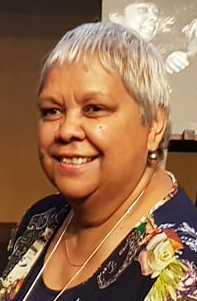
Jacqueline Gail "Jackie" Huggins is an Aboriginal Australian author, historian, academic and advocate for the rights of Indigenous Australians. She is a Bidjara/Pitjara, Birri Gubba and Juru woman from Queensland.
Bidjara, also spelt Bidyara or Pitjara, is an Australian Aboriginal language. In 1980, it was spoken by 20 elders in Queensland between the towns of Tambo and Augathella, or the Warrego and Langlo Rivers. There are many dialects of the language, including Gayiri and Gunggari. Some of them are being revitalised and are being taught in local schools in the region. The various dialects are not all confirmed or agreed by linguists.
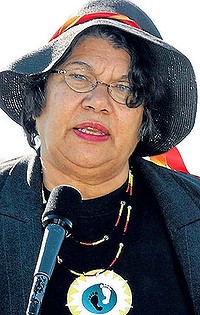
Ningali Cullen (1942–2012) was an Aboriginal activist and co-chair of the National Sorry Day Committee.
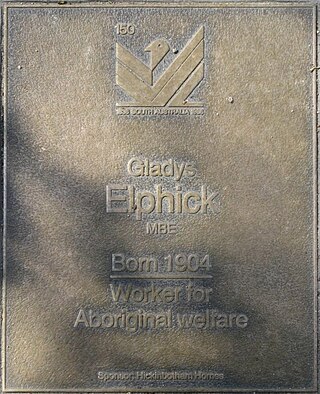
Gladys Elphick, also known as Gladys Hughes and Auntie Glad, was an Australian Aboriginal woman of Kaurna and Ngadjuri descent, best known as the founding president of the Council of Aboriginal Women of South Australia, which became the Aboriginal Council of South Australia in 1973.
The NAIDOC Awards are annual Australian awards conferred on Australian Aboriginal and Torres Strait Islander individuals during the national celebration of the history, culture and achievements of Australian Aboriginal and Torres Strait Islander peoples known as NAIDOC Week.
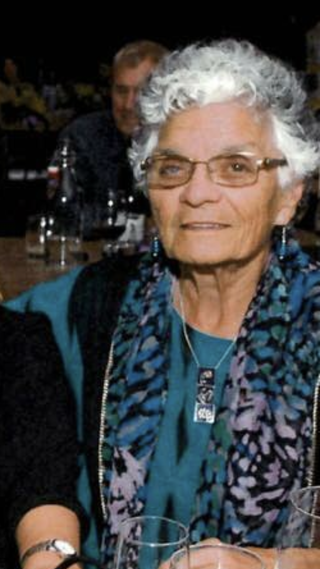
Joan Patricia Hendriks (1936-2020), also known as Aunty Joan, is a Ngugi elder of one of the three groups of Quandamooka people in Moreton Island, Queensland, Australia. She is the first Indigenous person appointed to the National Catholic Education Commission, and has brought Indigenous issues to the forefront at the United Nations and International Interfaith Forums.
Barbara McGrady is an Aboriginal Australian photographer and photojournalist based in Sydney, New South Wales. She is the first Indigenous Australian photojournalist.
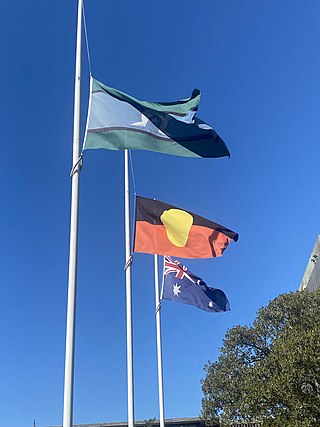
Reconciliation in Australia is a process which officially began in 1991, focused on the improvement of relations between the Aboriginal and Torres Strait Islander peoples of Australia and the rest of the population. The Council for Aboriginal Reconciliation (CAR), created by the government for a term of ten years, laid the foundations for the process, and created the peak body for implementation of reconciliation as a government policy, Reconciliation Australia, in 2001.
Elsie Heiss, also known as Aunty Elsie, is an Indigenous Australian, a Wiradjuri elder and a Catholic religious leader. She has led Aboriginal Catholic Ministry programs for over three decades and was NAIDOC Female Elder of the Year in 2009.
Chelsea Joanne Ruth Watego is an Aboriginal Australian academic and writer. She is a Mununjali Yugambeh and South Sea Islander woman and is currently Professor of Indigenous Health at Queensland University of Technology. Her first book, Another Day in the Colony, was published in 2021.
Aunty Jean Phillips is an Indigenous Australian elder and has been a senior Aboriginal Christian leader for over 60 years. She was born on the Aboriginal mission of Cherbourg, Queensland and later she served as an Aboriginal missionary herself with the Aborigines Inland Mission (AIM).
References
- 1 2 3 4 5 "NAIDOC Awards: Aunty Lynette Nixon wins Female Elder of the Year". NITV. Retrieved 9 August 2018.
- ↑ Eckermann, Anne-Katrin (2010), Binan Goonj: bridging cultures in Aboriginal health (3rd ed.), Churchill Livingstone, ISBN 978-0-7295-3936-4
- ↑ "Aunty Lynette Nixon". www.naidoc.org.au. Retrieved 9 August 2018.
- ↑ "News – Traditional Owners embrace reconciliation plan – Queensland Murray-Darling Committee". Queensland Murray-Darling Committee. Retrieved 19 September 2018.
- ↑ Prime Minister and Cabinet (16 July 2018). "National NAIDOC 2018 Award Winners". www.pmc.gov.au. Retrieved 9 August 2018.